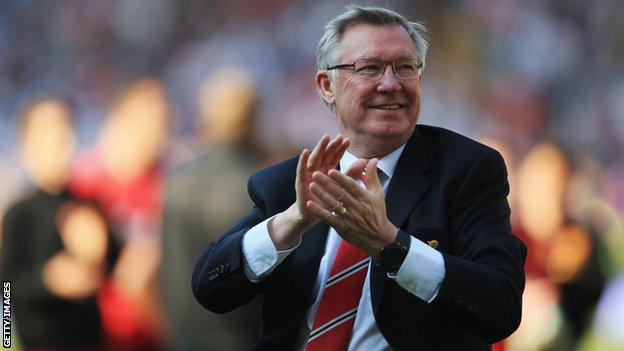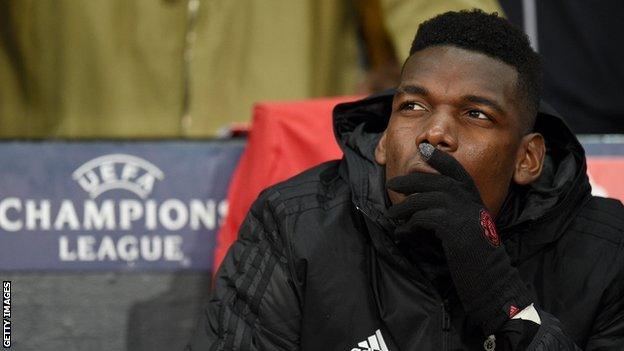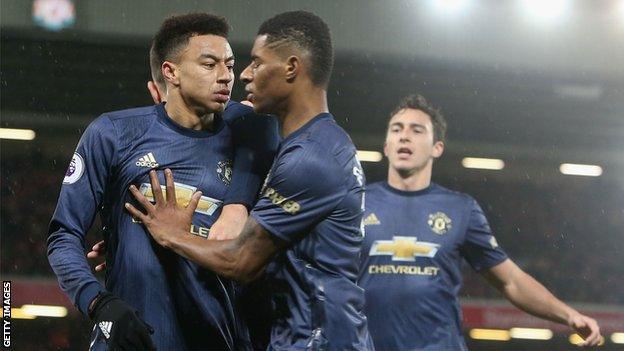Jose Mourinho sacking: Where have Man Utd failed since Sir Alex Ferguson's retirement?
- Published
- comments
Mourinho's Man Utd ups and downs
"Even if Sir Alex Ferguson had been handed the job of replacing Sir Alex Ferguson, he would have failed."
Manchester United have played 207 Premier League matches since legendary manager Sir Alex Ferguson retired at the end of the 2012-2013 season.
Now, for the fourth time in less than six years, they are looking for a new manager.
It is a remarkable situation given United used to be the template for longevity - the club having stood by Ferguson in the tough times to be repaid by a trophy-laden 26-year tenure the likes of which had never been seen before.
Under Ferguson, the game changed, the world changed, but because United were winning, the club didn't.
Only in recent times has the unintended consequence of those glorious Ferguson years become apparent.
That quote about the scale of the task of reshaping United post-Ferguson has been said to me several times - from the highest levels of the club.
Is the revolving managerial door a consequence of deep-rooted problems within the club that made it impossible for Mourinho, Louis van Gaal and David Moyes to succeed?
If it is, the appointment of the club's first technical director - and not manager - is United's biggest decision in the coming months.
A club too big for one man?
When Ferguson left United, it appeared they were in a healthy state.
They had just won the Premier League by 11 points, two seasons after reaching their third Champions League final in four years.
As it turned out, those successes - and Ferguson's brilliance - masked structural issues that meant when the Scot was no longer in charge, the club was ill-equipped to operate at the highest level in the modern era.

Ferguson won 38 trophies in his 26 years as manager at Manchester United
There is a recognition within Old Trafford that Moyes was doomed to failure as the support mechanisms required for such a role were simply not there. The football side was too big for one man to deal with alone.
Scouting had fallen way behind for a start. One issue United still wrestle with is Manchester City's willingness to put all scholars in their academy through private schooling, something that continues even after players have been released.
There could be no more damning evidence of United lagging behind in youth development than both Wayne Rooney and Darren Fletcher sending their children to City because they believed their potential careers would be better served away from the club where they enjoyed the best years of their career.
Rooney is known to have made his feelings about the ridiculousness of the situation clear to Woodward before he left for Everton in 2017.
What responsibility does 'naive' Woodward have?
The club have pinned the blame for Mourinho's exit squarely on him - highlighting his style, disharmony with the playing squad, lack of youth development and failure to embrace United's core values. But is it all his fault?
United did not just lose their most successful manager in 2013, they also lost a well-respected chief executive. David Gill remains a regular at matches - he was part of the United delegation at Anfield on Sunday - but the big decision-maker at Old Trafford is Ed Woodward.
Trusted by the Glazer family for driving through their controversial takeover in 2005, the former investment banker has been described as "naive" by former United captain Gary Neville.
Aside from presiding over three failed managerial appointments - Gill was fortunate in that he never had to make one - Woodward is regularly accused of caring too much about the club's commercial arm and not knowing enough about football.
In May, Woodward raised eyebrows when he said results on the pitch had little impact on finances.
Neville is among many to question why the 47-year-old improved and extended Mourinho's contract in January then, in July, blocked the Portuguese's attempts to sign a new centre-back.
"Who in that football club is qualified to tell Jose Mourinho he cannot sign a centre-back?" said Neville in October. "The club is rotten to the core and it has to be coming from the top."
A squad 'built' by four different managers
United did not introduce a director of football when Ferguson was in charge. In truth, there was no point. Why would anyone want to curb the power of the most successful manager there has ever been?
It is only now, three failed managerial appointments later, United are committed to bring in someone to oversee recruitment, to ensure a consistent thread runs through the club so they do not spend their money haphazardly on players who fit no pattern.
Mourinho used 14 players at Liverpool on Sunday. Two were home-grown, the remaining 12 bought by four different managers. Those who have a deep knowledge of the modern game, and United's place within it, have felt for a while the situation must be addressed as a matter of urgency.

Jose Mourinho signed Paul Pogba for a club record £89m from Juventus
The manager's voice should, ideally, be a strong one within the process of player recruitment but neutral observers feel there has to be some additional expertise to identify options to fit a general philosophy, so situations such as the one United now find themselves in can be avoided.
Whoever the new manager turns out to be, he will inherit a squad that is the remnants of the personal choices of Ferguson, Moyes, Van Gaal and Mourinho.
Little wonder, therefore, that while title favourites Manchester City and Liverpool have put their squads together with an overall plan, there appears little coherence about United's. Alexis Sanchez is an obvious and recent example, being bought when there was no real need, succeeding only in blocking a first-team place and doing very little to justify it.
For Sanchez, Paul Pogba and Romelu Lukaku, United invested nearly £200m and pay about £1m a week in wages.
In an important Champions League group game against Young Boys last month, none of the three started, despite all being fit. Sanchez did not even make the bench.
A flawed youth system?

Jesse Lingard and Marcus Rashford are the only home-grown players to feature regularly in the first team
Much is made of Chelsea's youth policy and the lack of first-team players that have emerged from five successive FA Youth Cup-winning squads.
Question marks are also being raised at Manchester City - and that criticism will only grow should a route not be found for the hugely talented, local-born City fan Phil Foden to fulfil his potential at a club he has been at since primary school.
But both Chelsea (at Vitesse Arnhem) and City (through their link with Spanish club Girona - owned by Pep Guardiola's brother Pere) have European options for youngsters not quite ready to break into their first-team squads.
United no longer send players to Royal Antwerp, as was the case with John O'Shea and others, so are reliant on individual loan deals for their rising stars, or hope they come through the Premier League's under-23 and under-18 competitions.
Yet United's academy director Nicky Butt has described the under-23 league as not being fit for purpose, and their relegation to Division Two last season is evidence they do not view the competition as a useful breeding ground.
Woodward saw evidence with his own eyes that the situation is improving when United beat Chelsea, winners for the past five seasons, in the FA Youth Cup on Monday. In Mason Greenwood and Jimmy Garner they have two teenagers seemingly destined for the top of the game.
But it has taken time and, apart from Marcus Rashford and Jesse Lingard, home-grown players have not made the breakthrough in recent years.